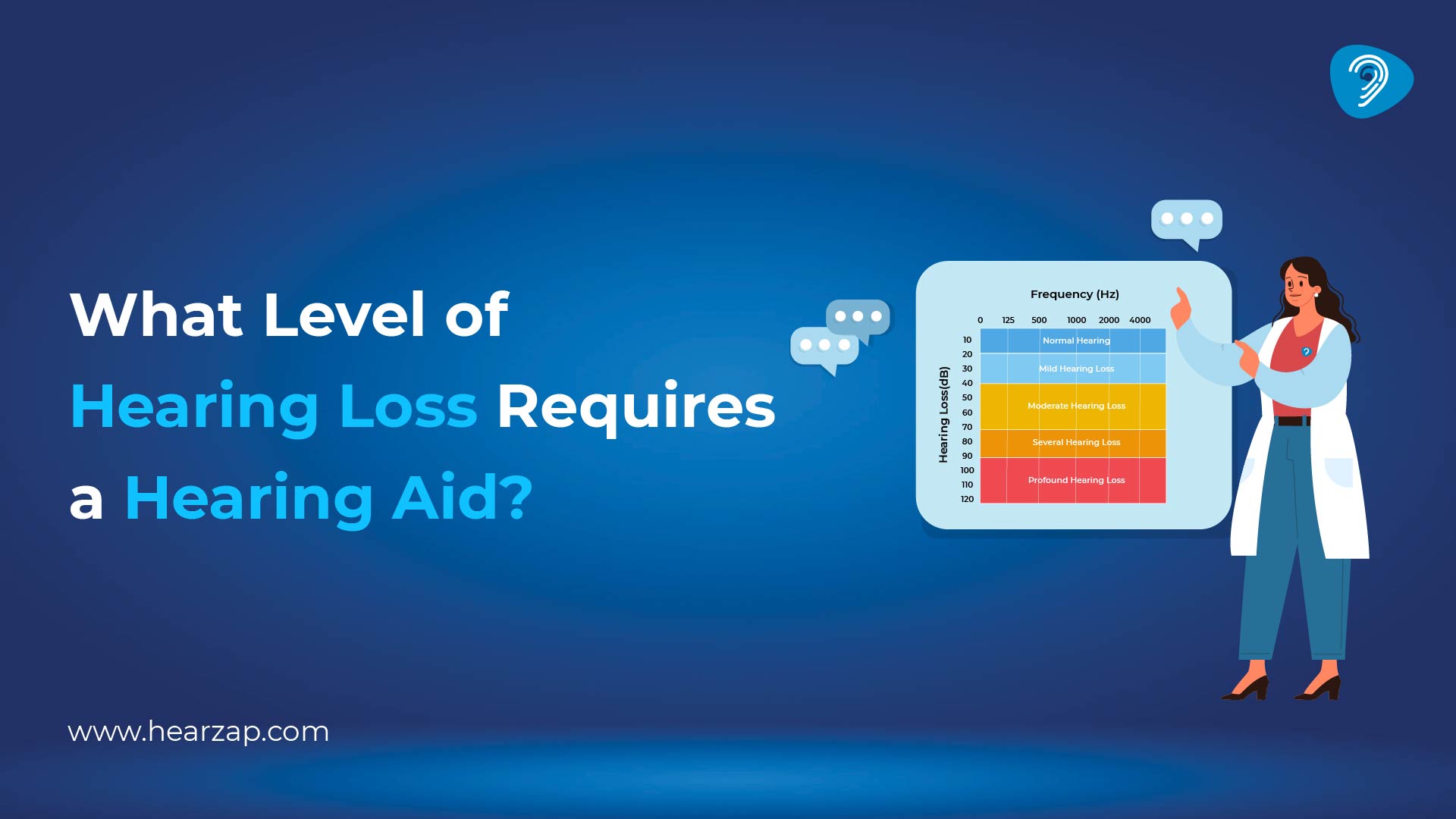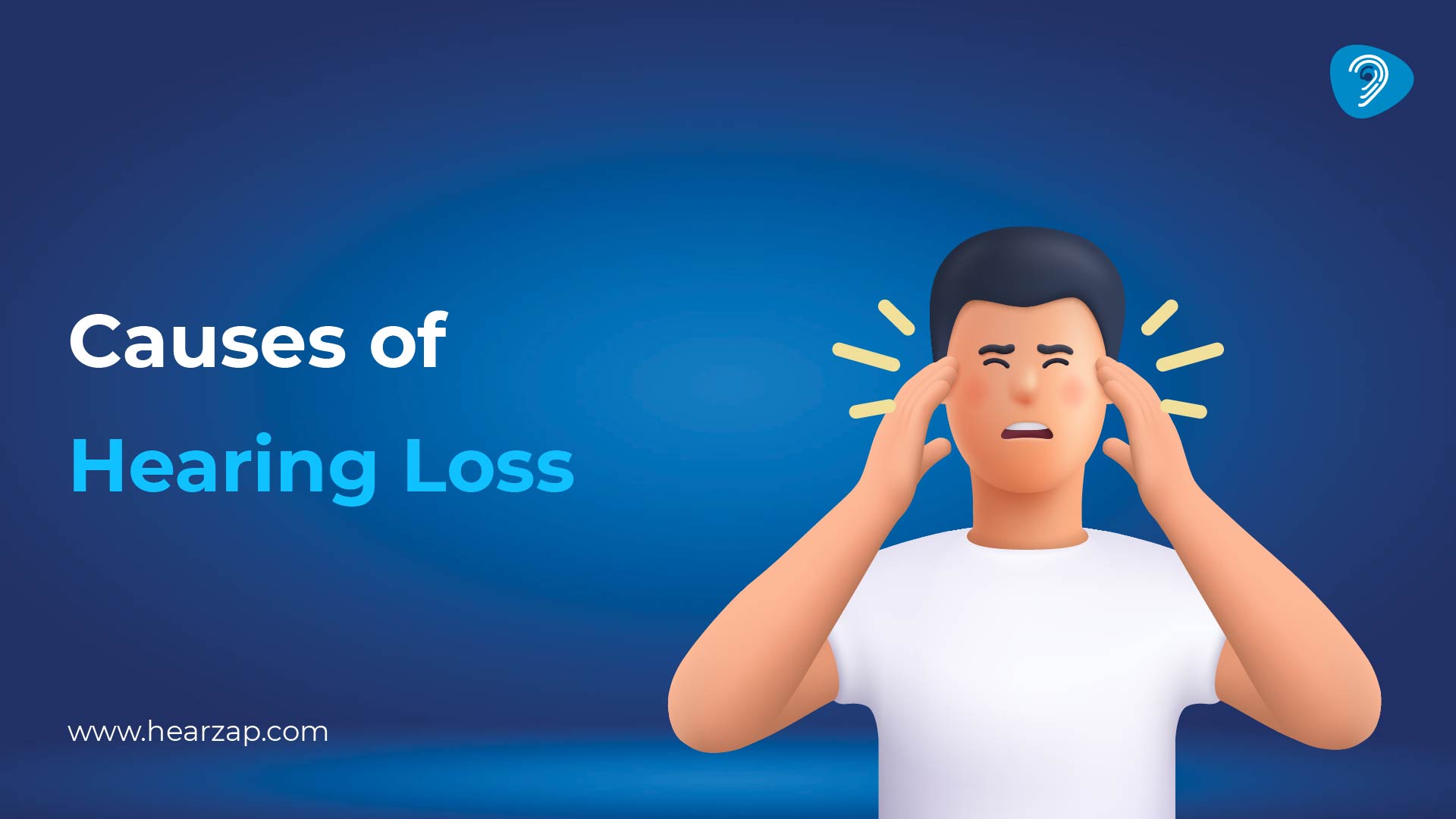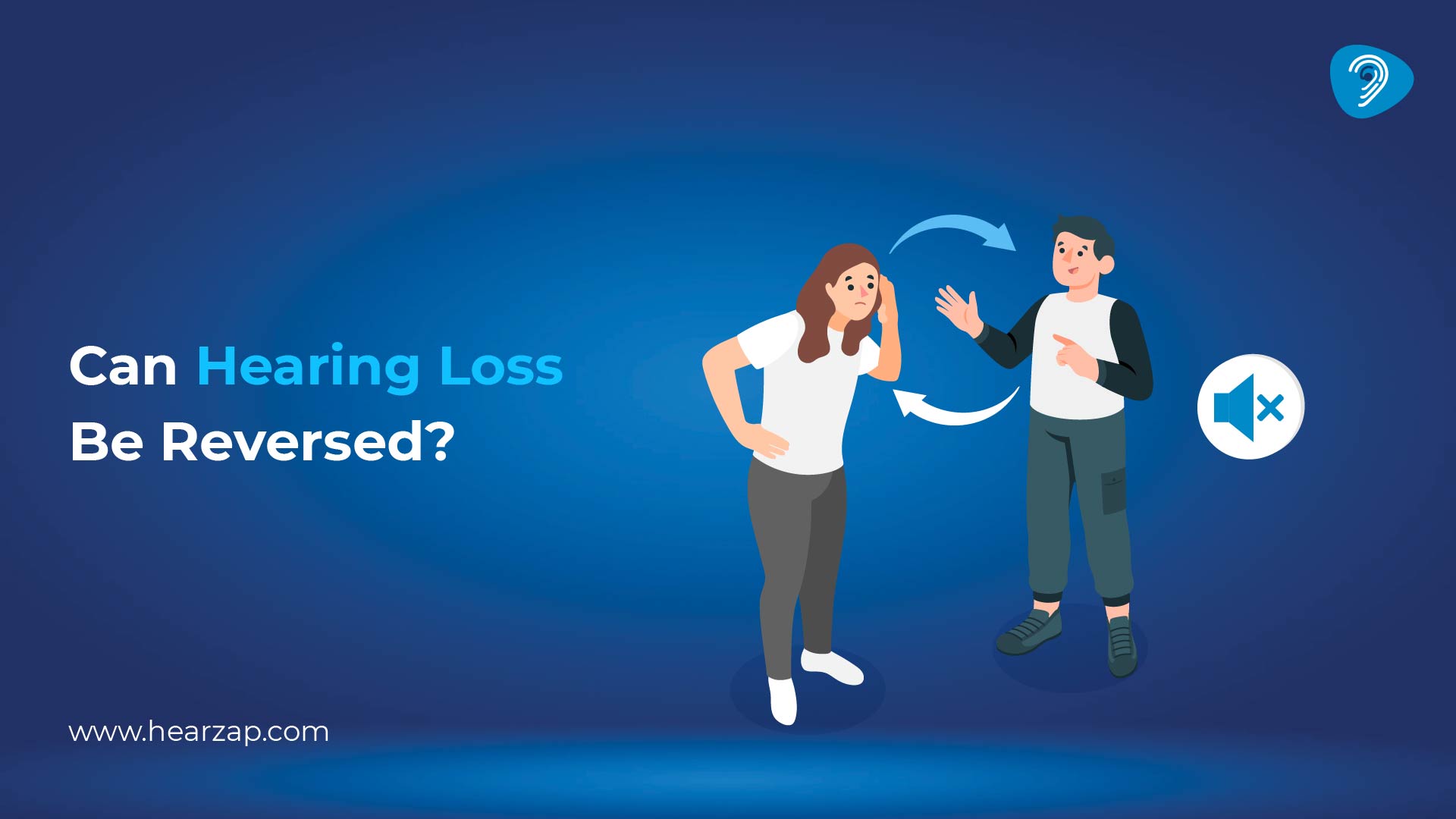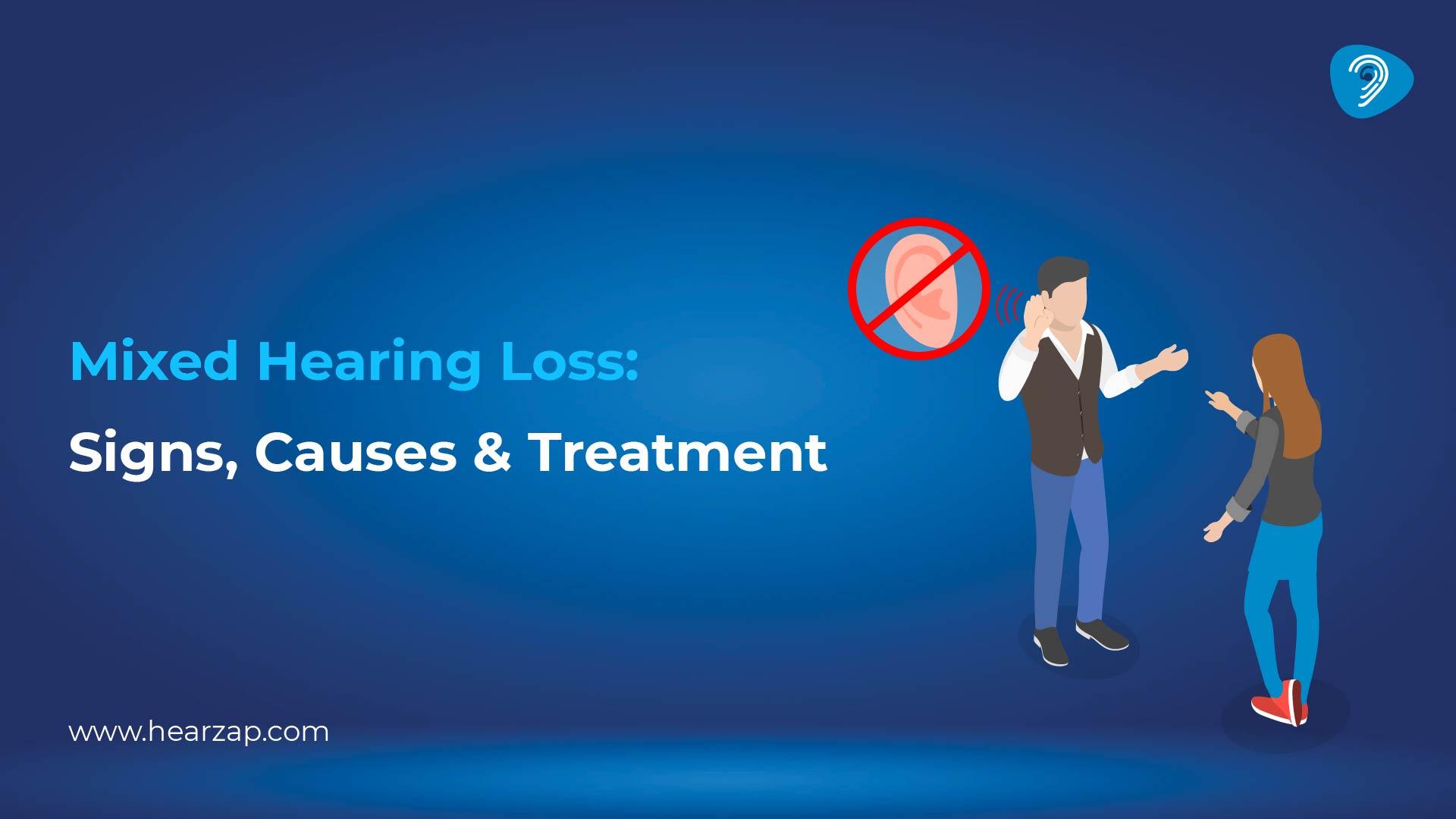HEARING LOSS
What Level of Hearing Loss Requires a Hearing Aid?
By Team Hearzap | Aug. 7, 2025

Have you ever caught yourself asking, “Is my hearing really that bad?” Maybe you’re missing bits of conversations, turning up the volume more than usual, or just feeling worn out after trying to follow a discussion in a noisy room.
The truth is, hearing loss doesn’t usually hit you all at once. It creeps in slowly. And many people don’t realise they need support until they’ve been struggling for a while. So, how do you know when it’s time to consider a hearing aid?
Let’s talk about it clearly, honestly, and without the technical overwhelm.
Degrees of Hearing Loss:
Hearing loudness is measured in decibels (dB). To make it easy, decibels is just a fancy way of measuring how loud a sound needs to be before you can hear it. The higher the decibel number, the more your hearing is affected.
Here’s how hearing loss is typically broken down:
- Normal hearing: 0–25 dB
- Mild hearing loss: 26–40 dB
- Moderate hearing loss: 41–55 dB
- Moderately severe hearing loss: 56–70 dB
- Severe hearing loss: 71–90 dB
- Profound hearing loss: 91+ dB
These are called hearing loss grades, and they help audiologists figure out how much sound you’re missing and whether a hearing aid would help.
But here’s the thing: your experience matters more than the number. That’s why the degree of hearing loss is just part of the story.
When Hearing Loss Starts to Get in a Way
Even a small change in hearing can wear you out. You might still hear voices, but miss key words. Or feel fine in quiet places but completely lost in a group chat.
Some signs that you may benefit from a hearing aid include:
- Struggling to keep up with conversations, especially when there’s background noise
- Feeling mentally tired after long chats
- Constantly turning up the TV or speaker
- Avoiding phone calls because you’re worried you won’t hear clearly
If any of these sound familiar, you don’t need to wait for things to get worse. A hearing aid could help now and make life a whole lot easier.
What Level of Hearing Loss Actually Needs a Hearing Aid?
Here’s a more real-world breakdown:
- Mild hearing loss (26–40 dB): You might still manage, but if you're tired of straining to hear, a simple device could help more than you expect
- Moderate hearing loss (41–55 dB): This level of hearing loss can make any conversation annoying, even at home. A hearing aid should be able to restore clarity as well as comfort to your life.
- Moderately severe to severe (56–90 dB): By then, it is really hard to hear without a support. A hearing aid isn’t just useful — it becomes essential.
- Profound hearing loss (91+ dB): The sounds of everyday life, like doorbells going off or alarms ringing, may be missed. You will need a more hardcore device or something else to use. But help is available.
The degree of hearing loss that needs a hearing aid isn’t just about a number, it’s about how much it’s affecting your life.
What If You're Not Sure Where You Fall?
Totally understandable. The best way to know is with a professional hearing test. It’s simple, quick, and gives you a clear picture of how your hearing compares to normal sound in dB.
And no, just because you get tested doesn’t mean you’ll be told to get a hearing aid right away. Sometimes, all you need is monitoring. But if you do need one, you’ll be guided to the right options. No pressure.
Why Waiting Can Make Things Harder
Lots of people wait years to address their hearing loss. Why? Sometimes it’s denial. Sometimes it’s fear. Sometimes it’s just not wanting to admit that things have changed.
But here’s what most people don’t realise: untreated hearing loss puts stress on your brain. You end up working harder to fill in the gaps, which can lead to fatigue, isolation, and even memory issues.
The earlier you take action, the more natural and helpful a hearing loss treatment plan (like a hearing aid) will feel. It’s much easier to adjust when the hearing loss is mild or moderate.
Finding The Right Hearing Aid For Your Needs
Not all hearing aids are the same and that’s a good thing. Today’s devices are discreet, smart, and custom-fit to your lifestyle.
Whether you just need help hearing soft sounds or you’re dealing with profound hearing loss, there’s a hearing aid out there that can support you. And if you’ve been told you need a hearing loss treatment plan, a hearing loss hearing aid is often the most effective (and simplest) first step.
Conclusion
If you’re wondering whether your hearing is bad enough to need help, it’s already worth looking into. You don’t need to wait for it to get worse. Sometimes the best time to take action is when you still have something to protect.
Getting a baseline test, learning your hearing loss grades, and understanding where you stand can make a huge difference, not just in how you hear, but in how you live.
FAQs
What are the 5 degrees of hearing loss?
Hearing loss is usually grouped into five levels: mild, moderate, moderately severe, severe, and profound. These levels describe how much sound someone needs before they can hear it, and they help audiologists understand what kind of support you might need.
What does a 40 dB hearing loss mean?
A 40 dB hearing loss means you're missing softer sounds like whispers, birdsong, or distant speech. You might hear people talking but miss certain words — especially if there’s background noise.
How many dB is normal hearing?
Normal hearing falls between 0 and 25 decibels. That means you can hear soft sounds — like a ticking clock or quiet conversation — without straining.
Is mild hearing loss curable?
Mild hearing loss isn’t always reversible, but it’s very manageable. Depending on the cause, treatment might include earwax removal, medication, or simply using a hearing aid to bring clarity back into your day.
What are the symptoms of mild hearing loss?
You might find it harder to hear people clearly in groups or noisy places. Others may seem to mumble, or you might often ask them to repeat themselves. It’s subtle — but it can be surprisingly tiring over time.
Also Read: How Hearing Aids Works
Hearing Aids For Severe and Profound Hearing Loss
Related Blogs

Causes of Hearing Loss

Can Hearing Loss Be Reversed

Mixed Hearing Loss: Signs, Causes & Treatment
Contact us
We are here for all your hearing needs, from hearing tests to hearing aids. Fill out the form below, and we will give you a call soon.
Please enter a valid mobile number with 10 digits.
Recent Blogs
By None | Feb. 16, 2026
By None | Feb. 9, 2026
By None | Feb. 7, 2026
By None | Feb. 6, 2026
By None | Feb. 5, 2026









